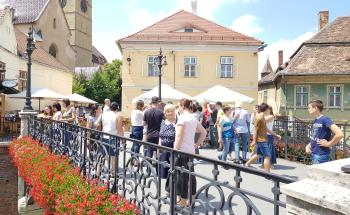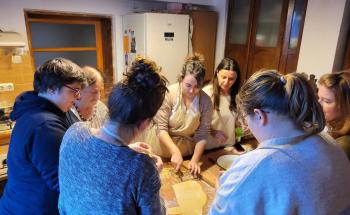
Communication, team building and solving problems
During this course, you will learn how to develop multicultural teams, organise project meetings, resolve conflicts and ensure effective communication.
What is waiting for you:
Interactive workshops - We offer 0% boring PowerPoint presentations and 100% fun, interaction, and guaranteed effective tools.
Description
Our Communication, Team Building, and Problem Solving course provide participants with the opportunity to develop and enhance essential skills for success in both professional and social environments. Rooted in theory and practice, this course equips individuals with the tools needed to become effective communicators, valuable team members, and confident problem solvers.
The course combines interactive lectures, hands-on exercises, case studies, and group activities to provide a holistic learning experience. We invite industry experts and facilitate open discussions to enrich participants' understanding.
This course is suitable for professionals across all fields and anyone looking to enhance their communication skills, become a valuable team member, and confidently tackle challenges in both professional and personal environments.
This course features:
• Outdoor activities in the morning and project management workshops in the afternoon. We believe that physical activity opens up the mind and creativity!
• Relaxation and reflection in one of the most beautiful place in Romania.
- Day 1:
- European projects, programmes, and portfolios
- Project life-cycle and timeline
- Introduction to Project Management
- Day 2:
- What are geographically dispersed teams
- Task delegation
- Team building techniques
- Key to successful project meetings
- Day 3:
- Team development phases
- Motivation
- Management and leadership styles
- Day 4:
- Communication blockers in a multicultural team
- Tips for creating a good communication plan
- Giving meaningful feedback
- Day 5:
- Building rapport with project team members
- Conflict management strategy
- Day 6 - Optional - visiting some museum or educational institutions.
- Every day, there will be an outdoor challenges organised to stimulate participants’ creativity.
We are always ready to help you with information about accommodation, transport and anything else you need.
Learning objectives
Understanding basic communication concepts:
- Identifying key elements of effective communication.
- Understanding types of communication (verbal, nonverbal, written) and their impact.
Developing listening skills:
- Learning active listening techniques to improve understanding and relationships.
Nonverbal communication:
- Awareness of nonverbal language and its influence on perception.
- Practical exercises to improve nonverbal communication.
Clear and concise expression skills:
- Developing skills to convey ideas clearly and efficiently.
- Practical exercises to improve speaking skills.
Conflict management:
- Learning conflict management strategies and dispute resolution.
- Role-playing exercises and case studies to practice conflict resolution skills.
Team communication:
- Developing collaboration and teamwork skills.
- Practical exercises to improve communication within groups.
Using technology in communication:
- Familiarization with modern communication tools and their effective use.
Empathy development:
- Improving the ability to understand and feel others' perspectives.
- Exercises to cultivate empathy and mutual understanding.
Planning and implementing solutions:
- Learning problem analysis skills and solution identification.
- Developing a structured process for problem-solving.
Constructive feedback:
- Learning how to give and receive feedback constructively.
- Practice giving feedback to improve performance.
These objectives should provide a solid foundation for enhancing communication and problem-solving skills in various contexts. It's important for a course to integrate both theory and practical exercises to ensure a deep and applicable understanding of the subjects.
Methodology & assessment
Interactive Workshops and Discussions:
Conduct interactive workshops to engage participants actively.
Facilitate group discussions on real-world scenarios to encourage critical thinking.
Role-Playing Exercises:
Utilize role-playing scenarios to simulate communication challenges and problem-solving situations.
Allow participants to practice applying learned skills in a controlled environment.
Case Studies:
Analyze real-world case studies to explore effective communication strategies and problem-solving approaches.
Encourage participants to discuss and present their analyses.
Guest Speakers:
Invite guest speakers with expertise in communication and problem-solving to share insights and experiences.
Q&A sessions with guest speakers can provide practical perspectives.
Self-Reflection Activities:
Incorporate reflective exercises for participants to assess their communication styles and problem-solving approaches.
Encourage the development of self-awareness and continuous improvement.
Team Projects:
Assign collaborative projects to enhance teamwork and communication within groups.
Evaluate project outcomes for effective problem-solving and communication.
Assessment:
Participation and Engagement:
Assess active participation in class discussions, workshops, and activities.
Consider the quality of contributions to encourage thoughtful engagement.
Individual and Group Assignments:
Assign tasks that require individual reflection and problem-solving.
Evaluate group assignments to assess teamwork and collaborative communication.
Presentations:
Have participants deliver presentations on specific communication topics or case studies.
Evaluate their ability to articulate ideas clearly and persuasively.
Certification details
Course participants will receive a certificate of attendence as well as an Erasmus + mobility certificate.
Pricing, packages and other information
-
Price:580Euro
Additional information
-
Language:English
-
Target audience ISCED:Primary education (ISCED 1)Lower secondary education (ISCED 2)Other
-
Target audience type:TeacherHead Teacher / PrincipalNot-for-profit / NGO staff
-
Learning time:25 hours or more
Past sessions
More courses by this organiser

Postural defects at students - their identification and correction



